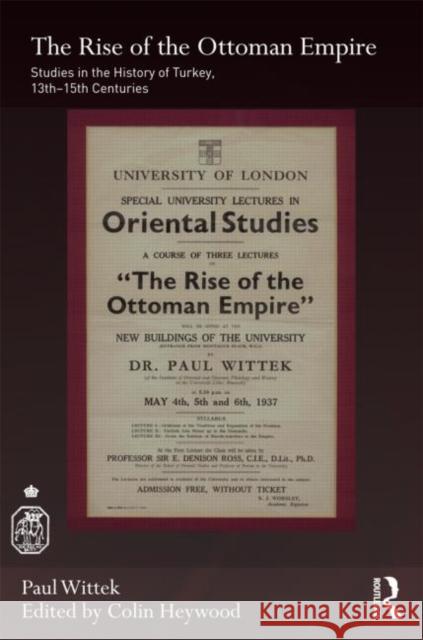The Rise of the Ottoman Empire: Studies in the History of Turkey, Thirteenth-Fifteenth Centuries » książka
The Rise of the Ottoman Empire: Studies in the History of Turkey, Thirteenth-Fifteenth Centuries
ISBN-13: 9780700715008 / Angielski / Twarda / 2012 / 200 str.
The Rise of the Ottoman Empire: Studies in the History of Turkey, Thirteenth-Fifteenth Centuries
ISBN-13: 9780700715008 / Angielski / Twarda / 2012 / 200 str.
(netto: 718,58 VAT: 5%)
Najniższa cena z 30 dni: 730,42
ok. 22 dni roboczych
Bez gwarancji dostawy przed świętami
Darmowa dostawa!
Wittek's The Rise of the Ottoman Empire was first published by the Royal Asiatic Society in 1938, and has been out of print for more than a quarter of a century. The opportunity has been taken at the present reissue of the test of Wittek's 1937 London lectures to bring together in one volume translations of his other studies on Ottoman history, dating mainly from his Brussels years, of which the Rise was in effect, a summation and a distillation. The majority of these other studies - 'Two Chapters on the History of Rum', 'The Sultan of Rum', 'Religious Warriors in the early Ottoman State' and 'From the Defeat at Ankara to the Conquest of Constantinople', were originally delivered in French (In one case German) at seminars or conferences in non-Nazi Europe in the mid to late 1930's. The journals in which they were originally published are for the most part inaccessible except in specialist libraries, it seems, in a period when Wittek's activities as an Ottoman historian are coming under increasing study within the Anglo-Saxon world of scholarship and in an increasingly monoglot age, that his luminous and persuasive prose and formative historical insights should be made accessible to
Wittek's The Rise of the Ottoman Empire was first published by the Royal Asiatic Society in 1938, and has been out of print for more than a quarter of a century. The opportunity has been taken at the present reissue of Wittek's 1937 London lectures to bring together in one volume translations of his other studies on Ottoman history, dating mainly from his Brussels years.
The majority of these other studies – Two Chapters on the History of Rûm, The Sultan of Rûm, Religious Warriors in the early Ottoman State and From the Defeat at Ankara to the Conquest of Constantinople – were originally delivered in French (in one case German) at seminars or conferences in non-Nazi Europe in the mid to late 1930s. The journals in which they were originally published are for the most part inaccessible except in specialist libraries, it seems, in a period when Wittek's activities as an Ottoman historian are coming under increasing study within the Anglo-Saxon world of scholarship. In an increasingly monoglot age, his luminous and persuasive prose and historical insights should be made accessible to a wider English-reading audience.
An edited introduction sets Wittek's work in its historical and historiographical context for the benefit of those students of later and present generations who were not privileged to experience it first hand.











